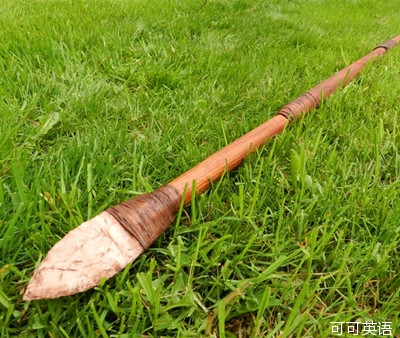Imagine. You're in a green landscape studded with trees and bushes. You're working in a team of hunters quietly stalking a herd of mammoths.
想象一下,你所在之處,一片綠樹(shù)蔭蔭、灌木繁茂,收眼盡是舒心的綠。你是一群獵人中的成員,正在采取團(tuán)隊(duì)作戰(zhàn)術(shù)悄悄地盯梢著一群猛犸象群。
One of the mammoths, you hope, is going to be your supper. You're clutching a light spear with a sharp, pointed stone at the end of it.
你期望著這其中某頭猛犸象將會(huì)成為你今天的晚餐。你握緊手中輕盈的長(zhǎng)矛,尖端上石制的矛尖鋒芒畢露。
You get closer - you hurl your spear - and it misses. The mammoth you wanted to kill snaps the shaft under its foot.
你期望著這其中某頭猛犸象將會(huì)成為你今天的晚餐。你握緊手中輕盈的長(zhǎng)矛,尖端上石制的矛尖鋒芒畢露。
That spear is useless now. You take another one, and you move on. And you leave behind you on the ground something that's not just a killing tool that failed, but a thing that's going to become a message across time, because thousands of years after the mammoth trod on your spear, humans will find that pointed stone spearhead and know that their ancestors were in this place far earlier than anyone had imagined.
現(xiàn)在那把長(zhǎng)矛成了廢物了。你拿起另一把長(zhǎng)矛,繼續(xù)你的旅程。然而那被你剛剛遺棄到地上的物品,可不止止是一件失敗的殺器,它將成為一個(gè)跨越時(shí)光的使者;因?yàn)樵谀敲歪锵蟛人榱四愕拈L(zhǎng)矛之后的幾千年后,后來(lái)人將會(huì)發(fā)現(xiàn)這件尖尖的石矛頭,從而知道原來(lái)很久很久以前,超出他們想象的早,他們遙遠(yuǎn)的祖先曾經(jīng)在這里留下了足跡。
'It looks so tiny and then it's only sort of two or three inches in length.'
“它看起來(lái)是真小啊,才差不多兩三寸英寸長(zhǎng)。”
'These are people on the move - explorers, and I can really feel quite a bit of empathy, and I can really feel what it must've been like to enter a country that nobody had told you about, that nobody had actually been in before you.'
“這些人類(lèi)永遠(yuǎn)在旅行中,是探險(xiǎn)者。我還真有點(diǎn)跟他們產(chǎn)生共鳴了;當(dāng)你走進(jìn)一個(gè)你一無(wú)所知的國(guó)家,沒(méi)有告訴你這是一片前人從來(lái)踏足過(guò)的土地時(shí),那種感覺(jué),我可以真切地感受到。”
It's 13,000 years ago, and you're in America.
現(xiàn)在從概是一萬(wàn)三千年前,你所在的地方是美洲。
Clovis spearpoint, made of stone, 13,000 years old and found in Arizona, United States of America.
克洛維斯石矛頭,距今約于一萬(wàn)三千年前以上,出土于美國(guó)亞利桑利州。
Things that are thrown away or lost can tell us as much about the past as any objects carefully preserved for posterity.
其實(shí)被丟棄或遺失的東西,也如同那些被視如珍寶一樣精心保存的物品,能向我們?cè)V說(shuō)那過(guò)去的故事。
Broken things tell poignant stories - in fact, mundane everyday items discarded long ago as rubbish, are as much a defining characteristic of being human as great art, and these modest but essential things can tell us some of the most important stories of all in human history.
殘破的物品訴說(shuō)著凄美的往事。事實(shí)上,當(dāng)年那些當(dāng)成日常垃圾拋棄掉的物品,在多年后的今天極可能與那些不朽藝術(shù)品同樣擁有定義我們作為人類(lèi)本質(zhì)特性的力量,并且往往是這些不太體面卻十分純粹的東西,向我們進(jìn)述了人類(lèi)歷史上那些最重要的故事。
In the case of this programme, how modern humans - the toolmakers and the artists we've been following this week - took over the world. How, after populating Africa, Asia, Australia and Europe, they finally got to America.
在這期節(jié)目中,這故事是關(guān)于現(xiàn)代人類(lèi),像我們前兩期已經(jīng)介紹過(guò)的那些工匠與藝術(shù)家們,是如何改造這個(gè)世界;又是如何繼非洲、亞洲、歐洲之后,最后到達(dá)了美洲大陸。












